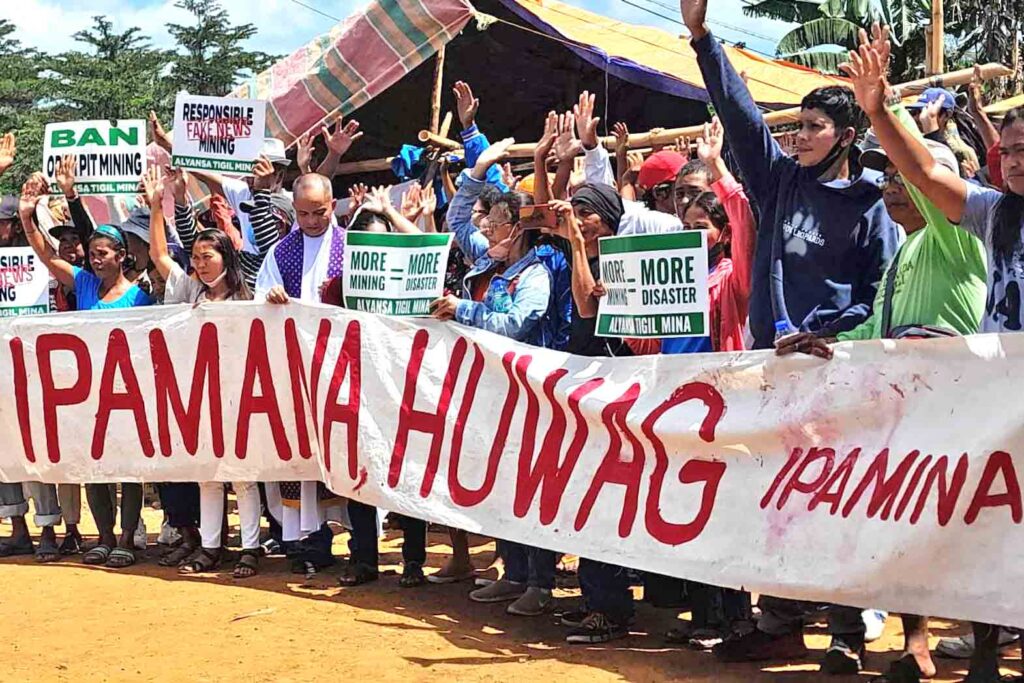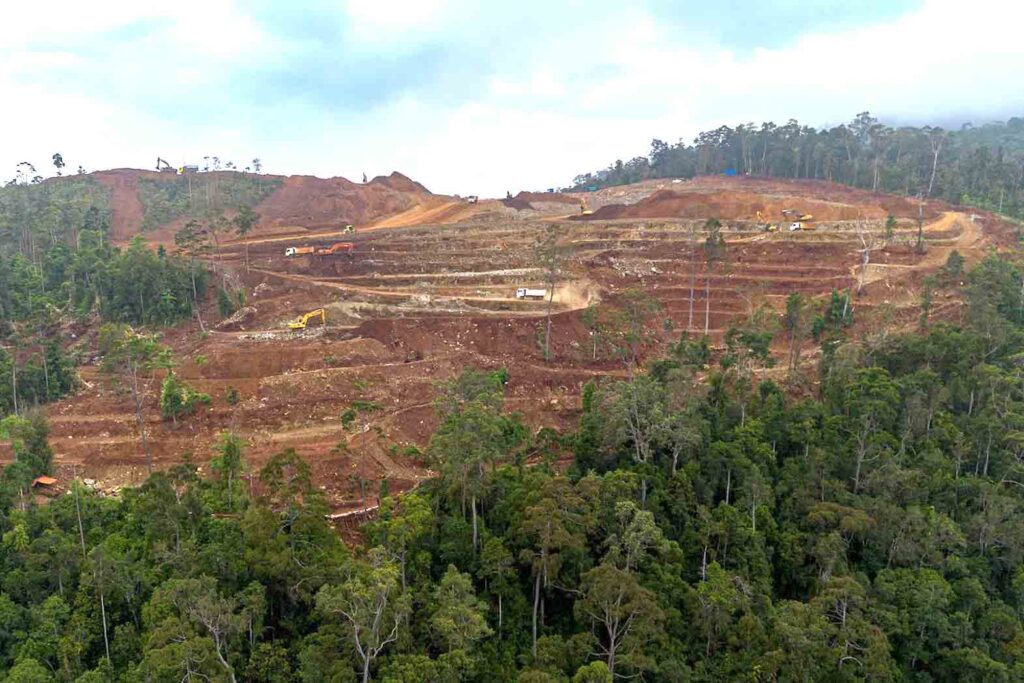
Bishop Socrates Mesiona of Puerto Princesa joins protesters at an anti-mining barricade in Brooke’s Point, Palawan on March 7, 2023. CBCP NEWS/With permission
“Our fight must continue,” Bishop Socrates Mesiona of Puerto Princesa said during the Mass he celebrated on March 7, 2023, at an anti-mining barricade in southern Palawan town of Brooke’s Point.
“As believers, we are called to protect and care for both creation and the human person.”
The bishop called the mining operations as the “Rape of Mother Nature” that will just be left naked, lone, and alone after being “abused.” But it’s not just Mother Nature, but also the poor are affected.
In the Philippines and many agriculture-oriented nations, the immediate bad effects of land degradation, deforestation and soil erosion lead to a decline in food production and a shortage of wood for fuel. When it happens, it hits the impoverished farmers the most.
It means the poor are worst affected because they do not have the means to replace the loss of valuable resources. Citing the pastoral statement of the German Bishops, Pope Francis says in his encyclical Laudato Si’ that “the impact of the present imbalances is also seen in the premature death of many of the poor, in conflicts sparked by the Ressourcenknappheit (shortage of resources).”
It means that “the cry of the earth is no different than the cry of the poor” and the rape of Mother Nature is no different from the abuse of the vulnerable.
And what Yeb Saño of the Global Catholic Climate Movement (GCCM) said in 2020 is no different from what the CBCP wrote in 2019. The CBCP and the Filipino clergy have joined Pope Francis in saying that those in the bottom of the economic pyramid are the ones mostly affected by nature’s abuse and they are the ones who cry to God for justice (See Laudato Si, 49).
Therefore, “it is our moral obligation to respond to their suffering” – now, today, and not tomorrow (CBCP, Pastoral Letter, 2019).
It’s not only the poor, but also the future of humanity that are gravely endangered, Benedict XVI once said. The Holy Father connected ecology with the higher obligations to human survival.
“The environment is God’s gift to everyone, and in our use of it we have a responsibility towards the poor, towards future generations, and towards humanity as a whole,” he wrote in his 2009 Caritas in Veritate.

The nickel ore mining site in Brooke’s Point town in Palawan province. CARITAS PHILIPPINES/With permission
Humankind cannot be saved from the outside. Only we, gifted with intelligence and free will, have changed the world for the worse, and therefore only we can change it for the better.
At this critical point in human history, as we run out of intelligent options, we are extremely limited to one communal and united act, that is, to save Mother Earth through RCA.
Rapid Climate Action or RCA starts with the optimal mobilization of all available manpower and resources to do all forms of collective action. That’s exactly what 220,000 parishes of the Roman Catholic dioceses worldwide, including eparchies of the Eastern Catholic Churches, are doing.
We recall that in 2020, Bishop Precioso Cantillas, his clergy, religious and the lay faithful of Leyte have made every Filipino proud. One sterling Vatican document on integral ecology, “Safeguarding Creation is everyone’s responsibility,” has made mention of the Diocese of Maasin as “the first diocese in the world to equip all parishes with solar panels” to generate renewable power.
In 2021, we also remember the circular letter sent by Archbishop Jose Palma of Cebu, who called for the “setting up of the Parish Ecological Ministry in all parishes in the archdiocese” in line with the implementation of the archdiocesan “500 Legacy Trees Program” and other environmental concerns. Obviously, Laudato Si has inspired many other dioceses to engage in various and more creative RCA projects.
Two things to remember. Fact one, by virtue of its geographic situation, the Philippines is a natural disaster zone of super-typhoons, volcanic eruptions, floods and earthquakes. And fact two, ours is also a country internally ravaged by climate abuses such as illegal logging and mining, dumping of chemical and toxic wastes of other countries, and thoughtless disposal of plastics. The first is natural and the second is man-made, which makes the first worse.
Fully aware of these two realities, in 1988, the Filipino bishops (CBCP) spelled out the world’s first pastoral letter on environmental stewardship titled “What is happening to our beautiful land?” This was the first time that a bishops’ conference, anywhere in the world, addressed the threat of environmental degradation and climate change, urgently calling all men and women of goodwill to take action to preserve the integrity of creation or RCA.
Between 1988 and 2015, in a period of 27 years, the rape of Mother Nature continued, and things got worse. In his 2015 Encyclical Laudato Si, no. 41, Pope Francis asks the basic question, citing the 1988 CBCP document verbatim:
“Who turned the wonder world of the seas into underwater cemeteries bereft of color and life?”
“This phenomenon is due largely to pollution which reaches the sea as the result of deforestation, agricultural monocultures, industrial waste, and destructive fishing methods, especially those using cyanide and dynamite,” adds the Holy Father once again quoting the CBCP pastoral letter of 1988.
Words and public talks and official statements are cheap. What matters today is RCA or rapid climate action, the Holy Father seems to say.
Dr. José Mario Bautista Maximiano is the author of soon-to-be-released Church Reforms – Semper Purificanda: Volume One (Claretian, 2023). the author of ‘MCMLXXII: 500-Taong Kristiyano (Claretian, 2021), Volume Two,’ that won recently the “Best Book in Ministry” during the 16th Cardinal Sin Catholic Book Awards 2022.

